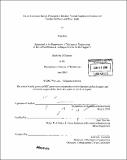| dc.contributor.advisor | Nam Pyo Suh. | en_US |
| dc.contributor.author | Luu, Way | en_US |
| dc.contributor.other | Massachusetts Institute of Technology. Dept. of Mechanical Engineering. | en_US |
| dc.date.accessioned | 2006-05-15T20:41:40Z | |
| dc.date.available | 2006-05-15T20:41:40Z | |
| dc.date.copyright | 2005 | en_US |
| dc.date.issued | 2005 | en_US |
| dc.identifier.uri | http://hdl.handle.net/1721.1/32954 | |
| dc.description | Thesis (S.B.)--Massachusetts Institute of Technology, Dept. of Mechanical Engineering, 2005. | en_US |
| dc.description | Includes bibliographical references (leaf 23). | en_US |
| dc.description.abstract | Axiomatic Design principles are used to design a vehicle suspension system. The use of Axiomatic Design helps to guide the design of a decoupled system. The Design Matrix (DM) illustrates the independence among the Functional Requirements (FRs) and the Design Parameters (DPs). The ultimate goal is the design of a fully independent suspension system in which the FRs stiffness, ride height, and damping can be varied as needed. To achieve the three FRs, three DPs are chosen - the volume of an air spring for stiffness, the volume of fluid in a fluid chamber for ride height, and orifice control for damping. This thesis investigates two DPs in depth, the air spring and fluid chamber. The nonlinearity of the air spring is studied and its effect on the system as a whole is simulated in Simulink. Two control systems are proposed in which stiffness and ride height are kept constant. The desired values for stiffness and ride height are predetermined by the user or by an optimization algorithm. The physical design for the control systems is also proposed in this thesis. The design for the air spring system uses an electropneumatic design, and the design for the fluid chamber system uses an electrohydraulic servovalve design. | en_US |
| dc.description.statementofresponsibility | by Way Luu. | en_US |
| dc.format.extent | 23 leaves | en_US |
| dc.format.extent | 971973 bytes | |
| dc.format.extent | 970093 bytes | |
| dc.format.mimetype | application/pdf | |
| dc.format.mimetype | application/pdf | |
| dc.language.iso | eng | en_US |
| dc.publisher | Massachusetts Institute of Technology | en_US |
| dc.rights | M.I.T. theses are protected by copyright. They may be viewed from this source for any purpose, but reproduction or distribution in any format is prohibited without written permission. See provided URL for inquiries about permission. | en_US |
| dc.rights.uri | http://dspace.mit.edu/handle/1721.1/7582 | |
| dc.subject | Mechanical Engineering. | en_US |
| dc.title | Use of axiomatic design principles to develop vehicle suspension controls for variable stiffness and ride height | en_US |
| dc.type | Thesis | en_US |
| dc.description.degree | S.B. | en_US |
| dc.contributor.department | Massachusetts Institute of Technology. Department of Mechanical Engineering | |
| dc.identifier.oclc | 62785969 | en_US |
